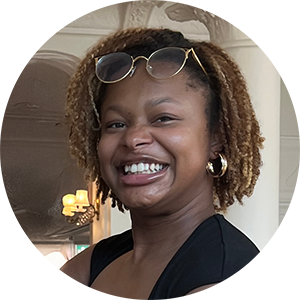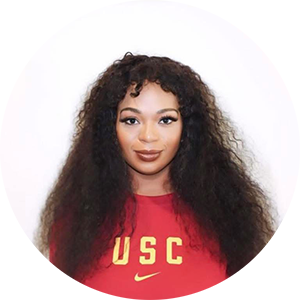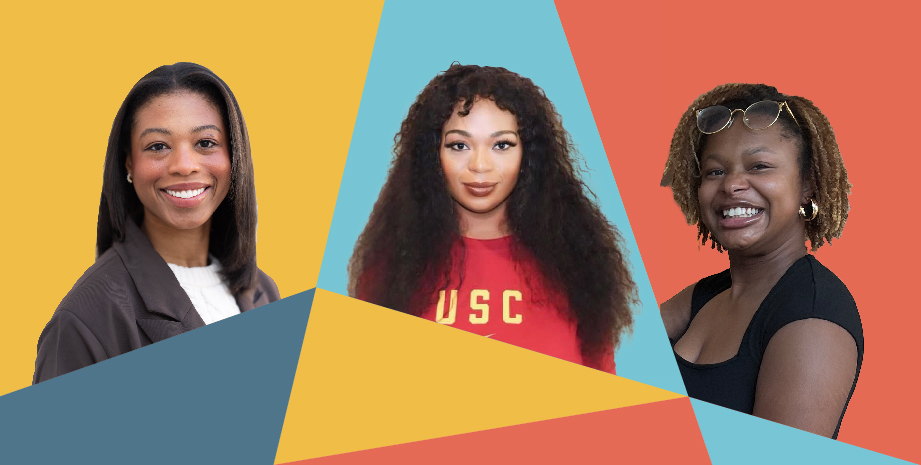Black professionals are underrepresented in audiology, speech-language pathology, and communication sciences and disorders (CSD), highlighting a need for greater diversity in the disciplines. Underrepresentation can affect access to culturally responsive care and inclusivity in the field. Black students who pursue careers in audiology and speech-language pathology often face unique challenges in their academic programs and must address systemic barriers in their education. As current students, we are paving the way for future generations, using our individual experiences and perspectives to push for greater diversity, equity, and representation in the professions.
The following students provide their perspectives:

Tyler Scott
Audiology graduate student at The University of Texas at Austin

Jennifer Armstrong
Speech-language pathology graduate student at East Tennessee State University

Skye Anderson
Speech-language pathology graduate student at University of Southern California
1. What inspired you to pursue a career in audiology or speech-language pathology?
Tyler Scott
The University of Texas at Austin
I was inspired to pursue a career in audiology because my sister wore hearing aids as a child. As a student, I look forward to developing lifelong relationships with my patients and their families while providing access to sound and while facilitating communication in the modality of their choosing.
Jennifer Armstrong
East Tennessee State University
My father was born fully blind, and I grew up advocating for him. He always shared how the support he received from the school for the Blind and other resources allowed him to be independent and thrive. He inspired me to work with individuals with disabilities, and when I discovered speech-language pathology, I knew it was the perfect career for me!
Skye Anderson
University of Southern California
I wanted to amplify the voices of marginalized individuals—who are often misunderstood or overlooked due to their unique communication styles.
2. What unique perspectives do you feel like you bring to the field?
Tyler Scott
The University of Texas at Austin
I hope to bring a sense of comfort and familiarity to patients who identify as people of color (POC). Having an audiologist who looks like you and understands you on a racial and cultural level helps to establish a mutual trust between patient and provider.
Jennifer Armstrong
East Tennessee State University
Not only as a Black woman but also as someone who is neurodivergent, I can relate to clients and further advocate for neurodiversity. I also bring the ability to educate my cohort on cultural humility and neuroaffirming practices.
Skye Anderson
University of Southern California
As an African American, I bring cultural insight, representation, and an understanding of the systemic barriers that impact diverse communities, which can help foster more inclusive and equitable practices.
3. How has your experience in your current academic program been shaped by your identity?
Tyler Scott
The University of Texas at Austin
Although I am one of a few Black students in my program, I’ve had positive experiences thus far. My program has done a great job of forming cohorts that are diverse across multiple fronts, including race and ethnicity. Having Black peers in the cohorts above me has helped me to feel comfortable in the program and confident in my presence as a Black student in audiology. Being a Black student has also helped me to identify gaps in audiology where Black and African American patients could be better served. The desire to bridge these gaps has inspired my capstone project and informed my clinical interests as well.
Jennifer Armstrong
East Tennessee State University
My experience has been challenging—from microaggressions to feelings of isolation—but it has led me to advocate for students and clinicians of color. It has also allowed me to have honest conversations with individuals in my program and drive meaningful change. For example, my program was open to me adding a diversity, equity, and inclusion officer position for our graduate NSSLHA chapter. They were receptive to my experiences, wanted to foster solutions, and recognized the unique challenges that I face as the only student of color in the program.
Skye Anderson
University of Southern California
Being part of a diverse academic environment has broadened my perspective, but as part of the 3.6% of Black SLPs in the country, I contribute a unique lens that challenges conventional thinking and promotes diversity within the profession of speech-language pathology.
4. How has the visibility (or lack thereof) of other Black professionals in this field impacted your motivation and career aspirations?
Tyler Scott
The University of Texas at Austin
Due to the small percentage of audiologists who are Black or African American, I don’t typically see audiologists who look like me at my clinic placements or out in the community. In fact, I’ve never even met a Black audiologist in person before. Being a Black student in a largely non-Black field can feel isolating at times for these reasons.
Fortunately, I’ve learned to seek representation for myself by connecting with Black audiologists and audiology students through social media. Attending conferences has also helped me to meet Black SLPs and other allied health professionals who are excited to learn about me, find out my clinical interests, and help me navigate the CSD field as a budding Black professional.
Jennifer Armstrong
East Tennessee State University
It’s a double-edged sword. The lack of representation has been discouraging and has fueled my imposter syndrome. However, it has also motivated me to seek out Black mentors in my field, join the National Black Association for Speech-Language and Hearing (NBASLH), and advocate for systemic changes that address the lack of diversity within the CSD field. My mentality has always been that I have to be part of the change. By advocating and pursuing a graduate degree, I can join the 8% of non-white SLPs.
Skye Anderson
University of Southern California
Although the lack of representation can feel isolating at times, it also motivates me to break barriers, increase awareness of the speech-language pathology profession, and pave the way for future Black professionals to see themselves in this field. Be the change you want to see.
5. What support systems or resources have been most valuable to you during your studies?
Tyler Scott
The University of Texas at Austin
Derica Parathundil, an AuD student from Gallaudet University, hosted a “Students of Color Safe Space Meeting” where students were able to connect and share their experiences being students of color in the profession of audiology. Any opportunity that allows me to interact with other students of color and form personal and professional connections is extremely valuable to me.
Jennifer Armstrong
East Tennessee State University
My Black, Indigenous, and People of Color (BIPOC) mentors—such as Dr. Dionna Latimer-Hearn and Dr. Mariam Abdelaziz—have been invaluable. Additionally, faculty members like Dr. Martha Sherrill and Dr. Kristy Eisenzopf have supported me and listened when I felt discouraged. Being involved with the Black Affairs Association at my university also helped me to find community and to access resources, especially when dealing with experiences that others in my cohort could never fully relate to.
Skye Anderson
University of Southern California
The National Black Association for Speech-Language and Hearing (NBASLH) has been instrumental in connecting me with mentors, graduate students, and Black professionals—providing guidance, shared experiences, and a sense of community.
6. What are the most significant ways you think the professions of audiology and speech-language pathology could better support BIPOC students and professionals?
Tyler Scott
The University of Texas at Austin
Facilitating opportunities for Black and African American students to meet each other can help combat isolation in the field. Additionally, initiatives like this, which highlight the Black student perspective, are amazing ways to support Black professionals in the field.
Directing Black students to organizations like the National Black Association for Speech-Language and Hearing (NBASLH) or creating mentorship programs for students can also help link Black AuD students and professionals in the field.
Jennifer Armstrong
East Tennessee State University
The field needs greater outreach and funding for students and faculty at historically Black colleges and universities (HBCUs) and the creation of more audiology and speech-language pathology programs at both the undergraduate and graduate levels. If there are no programs that are located in predominantly Black areas, how can we foster a pipeline for more Black professionals in audiology and speech-language pathology?
As future clinicians, we must shift from a cultural competence model to a culturally responsive perspective. It’s impossible to be fully competent in someone else’s culture, but focusing on cultural humility would encourage more candid and honest conversations about privilege, microaggressions, and bias. This shift would ultimately help you better understand how to respect and support Black professionals in the CSD discipline.
Through developing understanding, you can then become more culturally responsive—allowing you to appropriately include, and respond to, the combination of cultural variables and the full range of dimensions of diversity that an individual brings to interactions.
Skye Anderson
University of Southern California
The CSD field could offer more targeted funding opportunities—such as scholarships, grants, and fellowships to reduce financial barriers—as well as mentorship programs and initiatives aimed at recruiting and retaining African American students and professionals.
The experiences shared by Tyler, Jennifer, and Skye highlight both the challenges and the opportunities that come with being Black students in audiology and speech-language pathology. Although underrepresentation remains a pressing issue, their perspectives demonstrate the power of mentorship, advocacy, and community in shaping the future of the field. By increasing visibility, fostering inclusive spaces, and expanding support systems, we can work toward a profession that truly reflects the diverse populations whom it serves.
Change starts with conversations just like these—and with the commitment to create a more equitable and welcoming field for all.


How to check nid. NID Card Online Check. National nid card check. How to get nid in bangladesh online national id card check.